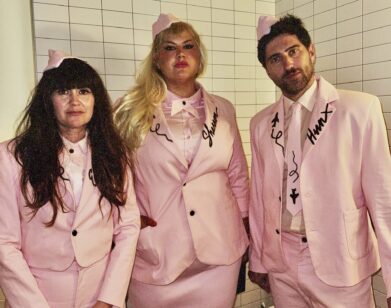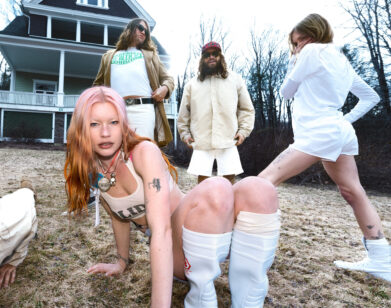Wild Beasts’ Immersion Program

HAYDEN THORPE (FAR LEFT) WITH THE REST OF WILD BEASTS.
The bucolic Lake District in northwest England boasts some of Britain’s most charming natural wonders—and in the last several years, one of its musical treasures: Wild Beasts. The foursome of self-described “weirdos” from Kendal cultivated a baroque pop sound and ran with it, first with Limbo Panto, their wickedly witty debut that served as an in-your-face riposte to the mundane life of their roots and the lads that populated it, then with the more refined but equally observant Two Dancers in 2009.
Wild Beasts’ formula is unlike any other in indie rock: Chris Talbot’s galloping, tom-driven rhythms, hypnotic guitar work from Ben Little, the wry crooning vocals of Tom Fleming, and the band’s signature not-so-secret weapon: Hayden Thorpe, he of an impossibly high falsetto that is both arch and erotic. The band has never sounded more sensual than on their third album, Smother. They rein in the flourishes and the playfulness, but find a new way to fascinate listeners, immersing them into the good, bad, and sometimes disturbing experience of falling in love. There’s “Plaything,” on which Thorpe’s narrator does “as I please” with his partner, “Deeper” and “Invisible,” which find Fleming smothering himself and forsaking all else for a newfound love, “Lion’s Share,” with Thorpe seizing upon his prey “like a lion takes his game,” and much more. A few days before he embarked on tour, we caught up with the one of pop’s most remarkable voices, Wild Beasts’ Hayden Thorpe.
JOHN NORRIS: Are you pretty far along in terms of rehearsals for the tour?
HAYDEN THORPE: We’re ready. We’ve invested a lot of time in it, and energy to make it sort of performable, really. All the songs were written and recorded before we could play them live. So it’s been a case of deciphering the parts, really.
NORRIS: How much of the new album is included so far?
THORPE: All of it, actually. Yeah, we’ve managed to do it all. Because with the record, one of our prerogatives was to be improvisational, so there’s a lot of that, a lot of spontaneity, a lot of one-take moments. And actually, when we went back to listen and pulled it apart, there was a large amount in of arrangements and sequences where we didn’t know who played it, when it was played and what it was played on. And that is the really exciting part—the whole mission statement we had was to make a beautiful record, because we knew we’d be living inside it for years. You know, you tour it and talk about it for two years. But we also realized that beauty means imperfection. It means allowing for accidents and allowing for crudeness really. There’s nothing worse than Photoshop beauty, or a “correct” beauty. So we made an effort to make something that wasn’t necessarily “correct” but that had an important, beautiful spirit.
NORRIS: So you don’t think that this album has less rawness to it than the first two?
THORPE: I don’t know—it’s a strange question, because it’s sort of more raw than ever. Because, a song like “Albatross”—part of it was recorded straight into my MacBook Pro mic, in the middle of the night, on a crude, out of tune guitar. And that’s one example how the spirit of that moment couldn’t be replicated. And we built this lush arrangement and high production around it. So it’s moments of crudeness and almost ugliness supported by beauty. We’re trying to strike a balance. I think on an emotional, thematic level, it’s more raw. It’s more shrouded in bravado and less about people’s stories and more about our own stories.
NORRIS: This time, it’s as though you guys are more immersed—there lyrics are more often first-person narrative, real immersion.
THORPE: I think so. I think we looked inward, got more introverted. Two Dancers as a record changed our lives: Now we were a world-touring band, and when you’re in a public life, you have two choices. You can either give yourself over to the public, or you look inward and you hold something dear. I think a lot of this record is getting in touch with those things that are real.
NORRIS: I noticed that some of the tour venues, at least in the UK, are somewhat unconventional—old music halls, ballrooms, social clubs, that sort of thing. Is it important to you to as much as possible to get a setting that is a bit offbeat, and maybe suits the music more?
THORPE: In the past, we’ve never been popular enough to dare to do that, and I think maybe we feel like we’ve reached a level of popularity, especially in the UK, where we can gamble and ask people to travel a bit, because there is a sense that we want to create a sense of atmosphere and do something different. Also, we grew up in a really rural, nothing town, where nothing happened. We would have to travel into cities to see the shows. And I remember one of the most amazing shows I saw as a 15, 16-year-old was The Strokes in Manchester. But The Strokes were just filled with this New York legacy and they could lean on this sort of glamour, this otherworldliness. And I think we realised we have to make music that says something about our world, and not try to be these untouchable creatures from the glamorous places, New York, Paris, LA, Berlin. You know, we make music from the Lake District.
NORRIS: The new album is called Smother, and there is a line at the end of “Vigil for a Fuddy Duddy” from the first album where you say “How you’d smother me / we’d be clumsy as virgins in vigil light.” The idea of a relationship being something smothering, suffocating—it seems like an idea that’s not entirely new for you.
THORPE: Yeah, I think you’re right. Thank you for pointing that line out; I actually forgot it existed. And I think from our perspective, we’re often writing about people slightly from the outside of things. Essentially, we tend to write love songs. And the normal format for one is “Oh my God, I love you so much right now,” or “Oh my God, I hate you so much right now,” or “Oh my God, I want you so much right now.” But I think maybe we’re trying to make a 3-D love song. In the sense that, maybe you can have too much of a good thing. I love you too much. Or the sense that, I’m so desperate, you could smother me right now, the state I’m in. But also, the use of the word “smother” on this record stems from the whole symbolism of feathers. And the pillow, and too much of a good thing. And we also thought about Icarus and flying to close to the sun, and the perils of enjoying life, really.
NORRIS: “Albatross” is the first single, and like a lot of the album, it’s beautiful but also disturbing—and the video, which features a dancer, reflects that.
THORPE: Well, it’s heavily bestowed with “The Rime of the Ancient Mariner,” the idea of the sailor shooting down this thing that guided him to calm waters. It’s destroying your guiding force. It’s a guilt song really, about burdens and living with that, about losing your guiding force through your own actions. And for the video, which was directed by Dave Ma, we wanted to have a grace and beauty and movement to it but also to have this stifling, suppressive quality. So I think it’s all about this dancer with freedom and expression but that’s sort of infringed upon by these unnerving figures.
NORRIS: I would say that overall, compared to the first two albums, Smother is a less playful record.
THORPE: The key is we’re not angry anymore. I think for a long time, we felt angry and frustrated with ourselves, with the world around us.
NORRIS: That earlier stance, the attitude of that first album, the confrontational nature of those songs, had me picturing you guys in almost a Clockwork Orange setting, taking on people in this arch but tough way.
THORPE: Again, we grew up in this rural area where it wasn’t a social thing to be in a band, it wasn’t a cool thing. It was a weird thing. We were the weirdos, and it sort of becomes a self-fulfilling prophecy—if you are made to feel like weirdos, you become weirdos, you know? And so confrontation and protest becomes something of a blood sport.
NORRIS: How do you think these more restrained, soulful songs on this album, say “Invisible,” are going to work in the live shows next to some of the more exuberant older songs like “We’ve Got the Taste” or “All the King’s Men”?
THORPE: I think they will, having tried them out. Because they’re all of the same gene pool, the same DNA. They’re just different reflections of that DNA. And I think a live show is different, too, in that you can rely on directness and spontaneity, and the instantaneous nature of live shows is all about sharing, and you can play with the dynamics. It’s fun.
WILD BEASTS’ SMOTHER IS OUT MAY 10. THE BAND WILL PLAY US DATES JULY 12-16. FOR MORE, VISIT THEIR MYSPACE.






